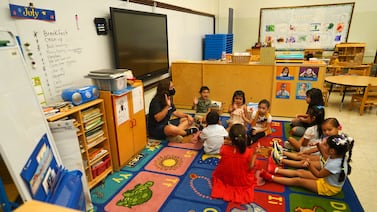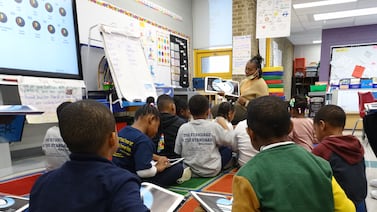The first day of classes in the Detroit school district will be Monday, Aug. 28, according to the 2023-24 academic calendar approved by the school board Tuesday. Teachers are expected to report a week before that, and the last day of school is June 7, 2024.
It’s the second straight year that the Detroit Public Schools Community District will start classes before Labor Day.
The calendar omits an observance of the Muslim holiday Eid al-Fitr, which occurs during the middle of the second week of April in 2024. The district began recognizing Eid as a school holiday in 2021-22 following a student-led campaign. In 2022-23, the district calendar didn’t include Eid al-Fitr, because the holiday began on a Friday evening.
For the coming year, the district and its unions “found it difficult” to add another holiday without extending the school year deeper into June, “which historically has caused higher rates of student absences and safety issues,” district spokesperson Chrystal Wilson said in an email.
Wilson said employees also did not want to shorten their other weeklong breaks.
“However, the District is strengthening policy to ensure that any student who is absent due to a religious holiday not recognized as a day off on the District calendar will be excused and additional time granted to fulfill academic assignments missed,” Wilson said.
A 2005 Michigan law championed by the tourism industry barred schools from starting before Labor Day unless they received permission from the Michigan Department of Education. Many districts have done so, but legislation introduced in the Michigan House would repeal the law altogether.
A DPSCD report noted that the early school start “yielded improvement in student attendance and student achievement through increased professional development for staff.” The academic calendar requires district staff to participate in six professional development days spread throughout the school year.
The recommended calendar for next year was approved by DPSCD’s employee unions. Under Michigan law, school districts can set the starting date of their school year without union approval, but other aspects of the calendar are subject to collective bargaining.
Here are some things to know about the calendar:
- The Friday before the Labor Day weekend is a day off for students. State law requires that schools not be in session that day.
- Fall count day falls on Wednesday, Oct. 4, while spring count day is on Wednesday, Feb. 7. State education funding to Michigan public schools is based largely on student attendance on those days.
- Thanksgiving break starts on Wednesday, Nov. 22. Classes resume on Monday, Nov. 27.
- Winter break runs from Monday, Dec. 25, through Friday, Jan. 5, 2024. Classes resume on Jan. 8
- Mid-winter break falls during the week of Feb. 19.
- Spring break is the week of March 25, and includes Good Friday on March 29.
Ethan Bakuli is a reporter for Chalkbeat Detroit covering Detroit Public Schools Community District. Contact Ethan at ebakuli@chalkbeat.org.







